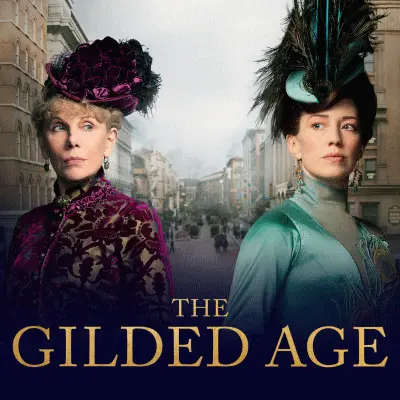The Gilded Age is like a Disney version of the period it portrays
-

Julian Fellowes' new HBO series was inspired by Edith Wharton’s milieu of 1880s New York City, but misses the point of her work entirely, says Sophie Gilbert. "Like Wharton’s work, it documents a time when the rapacious accumulation of American resources and capital by a handful of industrialists was causing a palpable shift in the social order," says Gilbert. "This is, we might say, timely terrain. But The Gilded Age, stacked with a revolving door of Broadway’s stars, feels not only flat but also myopic. It grabs from Wharton’s themes but somehow entirely elides her fundamental observation: that this culture is so corrupted that the only people who can thrive within it are either mindless or irredeemable. If Downton cribbed from commedia dell’arte, The Gilded Age feels almost like Disney. It opens with a montage of PBS-familiar shots: sheep grazing in the green fields of Central Park, edifices rising up in stony grandeur, servants scurrying like mice. There’s a striking sense of unreality to it. Despite the size of the budgets involved—which was why the series, originally destined for NBC, was eventually shipped over to HBO—the city feels less like old New York than a Warner Bros. lot. Everything is too pristine. The overreliance on CGI to spruce up the scenery only adds to the uncanny-valley effect, as if we’re looking at dollhouses that have been elaborately constructed for full-size people." Gilbert adds: "Wharton is unlikely to have approved of such a half-hearted imitation of her work. No one more subtly rendered the toxicity in mannered society, the ugliness of a world in which status can be entirely divorced from morality. In 1947, the literary critic Diana Trilling wrote of Wharton’s The House of Mirth that it is 'one of the most telling indictments of a social system based on the chance distribution of wealth, and therefore of social privilege, that has ever been written.' Wharton’s New York, fully in thrall to money, celebrity, and power, feels almost more feudal than Downton does. But The Gilded Age takes this teeming morass of a historical period and essentially focuses on a single animating question: Will Bertha win the reigning socialite Mrs. Astor’s approval? As social commentary goes, it’s less The Custom of the Country than The Real Housewives of Washington Square."
ALSO:
- The Gilded Age could've been perfect Prestige TV -- instead, it's Mean Girls with corsets: "The Gilded Age is the perfect setting for prestige TV in the 2020s: A period that juxtaposed dizzying wealth with grinding poverty, idealistic rhetoric with pervasive corruption, and moral reformism with omnipresent corruption, the decades that followed the Civil War resemble our time more closely than any other era in American history," says Samuel Goldman. "But television is a visual medium, and a successful show needs to be something to see as well as to think about. Happily, the period is an aesthetic feast, too, from the rich colors and patterns of its clothing (not the austere black and white we know from photographs) to the imposing architecture and luxurious furnishings of its mansions. Unfortunately, The Gilded Age, which aired its first episode on HBO Monday, is not the show we need. Created by Julian Fellowes, best known as the creator of Downton Abbey, the series reduces the turmoil and excitement of the period to Mean Girls with corsets and tailcoats. Many elements of the production, from the vaguely anxious strings of the musical theme to the Muppet grimaces that greet every faux pas, are borrowed from Fellowes' earlier hit. But without that show's superb cast and the magic it derived from shooting in a real great house, it's hard to care who's going up and who's headed down in the social roller coaster on which the characters chug along."
- The Gilded Age is a dream come true for Downton Abbey fan Christine Baranski: "I adored it," she says of Julian Fellowes' Downton. "Like so many people, but particularly so many actors—and even more particularly, so many actresses—I would watch it and think how I would love to work on something like that. How I would love to be in a period costume drama that goes on, that keeps telling the story of a given group of people. I'd always look on with awe at Maggie Smith and the hats and the outfits and the attitude. I remember hearing years ago that Julian was thinking of doing an American version of Downton and thinking, Oh, my God, I would do anything to be a part of that. So this is definitely a dream come true."
- Helen Uffner, who dressed The Gilded Age cast with her extraordinary collection of vintage women’s wear, is struggling to keep her business afloat in New York City
- How the pandemic shutdown gave The Gilded Age the chance to fill its cast with Broadway stars
- How The Gilded Age prepares its sumptuous feasts
- Five Edith Wharton books to read after watching The Gilded Age
TOPICS: The Gilded Age, HBO, Christine Baranski, Edith Wharton, Helen Uffner
More The Gilded Age on Primetimer:
